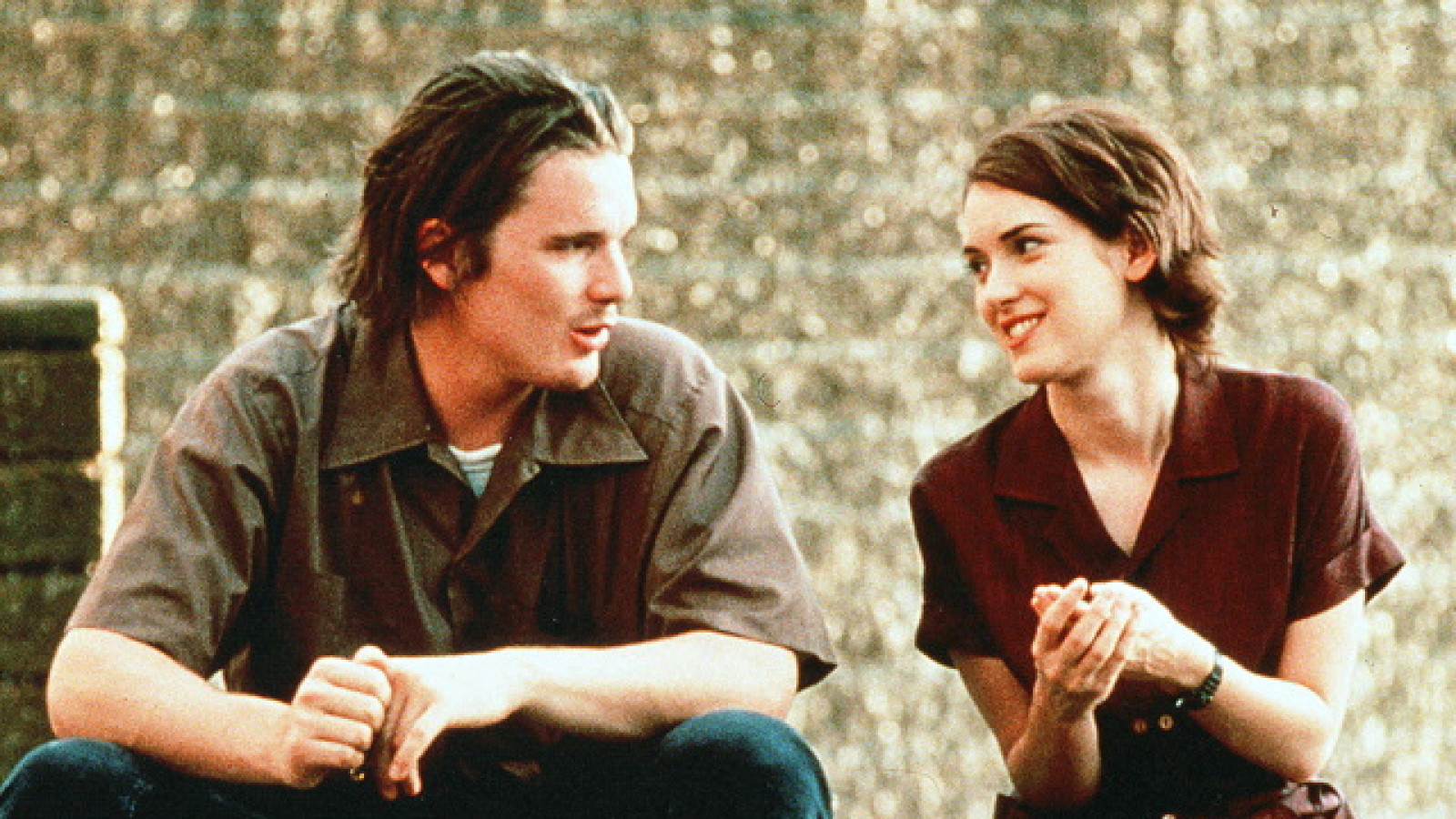Almost 30 Years Later, ‘Reality Bites’ Still Rings Painfully True

You ever just get a yen for a specific genre of movie, or a specific actor, or a specific era of filmmaking? I don’t know why, but all three have been hitting me in a very particular place: I’ve been really, truly curious about Ethan Hawke films from the ’90s. The most recent watch, one that’d been on my list for a long time but I’d never seen, was 1994’s Reality Bites.
Written by Helen Childress and directed by Ben Stiller (his directorial debut, no less), Reality Bites follows the misadventures of Lelaina Pierce, played by an almost too-cute Winona Ryder. Lelaina graduated valedictorian of her class, with dreams of being a filmmaker, but the film opens with her being unable to give any consolation to her classmates. While she recognizes that the world is built off a bullshit system that no young person wants to conform to (80-hour work week, pressure to buy luxury items, etc.), she cannot think of an alternative to the grind. So her simple answer to this dilemma is: “I don’t know.”
Such a lackadaisical sentiment of borderline nonchalant concern carries throughout the rest of the film. Lelaina and her friends—carefree Troy (Ethan Hawke), sardonic Vickie (Janeane Garofalo), and shy Sammy (Steve Zahn)—are all more or less dumped from the collegiate environment into the “real world,” where they’re forced to float around and find out. Now, my generation (kids born during the 90s and early 2000s) has been dealt such a crappy hand, I just sort of figured that a movie like this would be a fun retrospective on a different, slightly more promising time.
Instead, this quintessential representation of Gen X pop culture was startlingly reminiscent of the struggles my friends and I have had to go through post-graduation. Finding work was a big point of commonality: Lelaina is able to land a television gig right out of school, but it’s soul-sucking and demeaning. My god, how I’ve been there. When her smart mouth ends up costing her that job, she’s confronted with a workforce that doesn’t seem to want her, as she applies high and low yet cannot seem to land even the most minimum-wage of gigs. Depressed and aimless, she begins to spend her days sitting on the couch and binge-watching television in a montage that had me asking, “Jesus Christ, how did they predict the COVID unemployment days?”
Meanwhile, her dating life feels like it could have been pulled from my immediate reality. She starts seeing a network exec, Michael (Ben Stiller), who’s everything a “model-twentysomething” should be: buttoned-up, smart, and surface-level kind, with a good steady job and a nice car. He’s the exact opposite of the crowd she runs with, and the crowd in question finds this funny. Michael’s main fault is in his willingness to conform to the expectations of the biz, even at Lelaina’s expense.
But on the other end of things is Troy, whom she kind of hates yet cannot help but feel attracted to, with his nonchalant attitude and commitment to living freely. Lelaina ends up shouting at him for judging everyone while not having a job or contributing to the rent, which are very real frustrations when you’re in your twenties and trying so hard to make it all work, while the people around you are seemingly doing just fine through half the effort. Yet at the end of the day, Troy is the one she can really let her guard down around, and the scene where they walk around just smoking cigarettes and shooting the shit felt like it was taken straight out of my own life. These days, some of the best memories we can have are the ones where we share a stolen moment with someone who really gets us, a moment of peace in middle of the rat race.
All the while, Lelaina is trying to bring some meaning to her life through her filmmaking, documenting the little moments in her life that feel worthy of note. Vickie is concerned that her promiscuous lifestyle will lead her to contract HIV, while Sammy, who’s gay, wants to experience intimacy with someone for the first time, yet is deathly afraid of his conservative parents finding out. The things that Lelaina captures on film are precious and real, yet when she finally gets an opportunity to have her work showcased by a major network, it’s diluted into something of a reality-TV comedy reel. This might have been one of the most startling comparisons for me to see, how even back then, authenticity was easily commodified and sanitized for a quick buck.
Of course, there are a lot of things about the movie that don’t hold up today: the various social dilemmas of the 90s were pretty specific to their time, and the MTV era of television was ultimately a different breed. Plus, the four friends were able to live in a house together with only one or two people working full-time at any given moment, which is … definitely not how things are now! I remember going to friends’ houses in college where 3 bedrooms and a living room managed to accommodate over 7 people at any given moment. Also, just the overall tone of the film is very much that of a ’90s movie, in a very quick and silly sort of way.
Even so, it was comforting to see that even 20 or so years ago (and presumably another 20 or so before that, and before that, and on and on), American twentysomethings were still going through the same shit. It’s a dog’s life out here, but we make it work, and we find our own ways to make beauty and meaning out of it, all the same. Yeah, reality bites, but what are ya gonna do?
(Featured Image: Universal Studios)
Have a tip we should know? [email protected]
